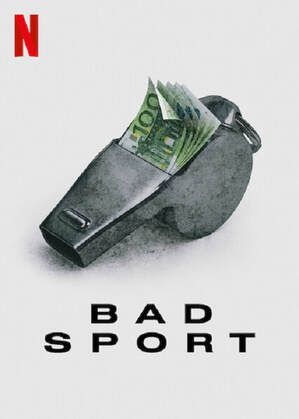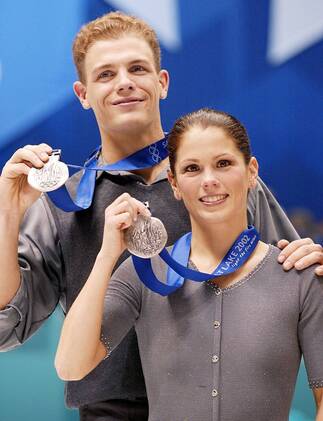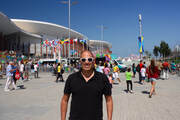Russian Interference* at Salt Lake 2002 was Bad Sport
(*Alleged)
A Quick TV Review
Last week, French ice dancer Guillaume Cizeron highlighted a "surge of hate" directed towards him, eventually prompting a statement and investigation from the International Skating Union. As an out gay man, Cizeron has been on the surely, unfortunately, been on the receiving end of online abuse, but comments gained steam when a Russian skating official critiqued Cizeron's ability, as a gay man, to properly convey a sense of romance with his skating partner, Gabrielle Papadakis. More on this in a bit...

With Beijing 2022 quickly approaching, and with (a) Russian misstep again circling figure skating, it seemed appropriate to revisit "one of the biggest scandals in Olympic history".
"Cold War" takes us back to Salt Lake City 2002's pairs competition. There, the highly anticipated gold medal duel between Canada's Jamie Sale & David Pelletier and Russia's Elena Berezhnaya & Anton Sikharulidze turned into much more off the ice.
It certainly was a gripping story at the time...even before the scandal set in. Could 2001 world champions Sale & Pelletier win gold, and snap the Russian (and Soviet / Unified Team) streak of pairs titles dating back to Innsbruck 1964?
Accurately framing that question within the context of North America vs Russia sports politicization chatter around the event at the time, "Cold War" dives in.
In quick recap...the two pairs enter the long program in 1st (Berezhnaya & Sikharulidze) and 2nd place (Sale & Pelletier), where the best performance would (should) win gold. Despite a widely recognized flawless performance vs at least one visible mistake by the Russians, the Canadians finish second for the silver medal, to the incredulity of the vast majority of (North American) fans and pundits. Five judges voted for the Russians, four for the Canadians.
Overnight, the French judge, Marie-Reine La Gougne, seen as the crucial "fifth vote" for the Russians, breaks down with the implication that French authorities above her coerced her vote. Although she would later walk back her statements, the scandal was set. And a sinister plot involving a Russian mob boss and a quid pro quo vote from a Russian ice dancing judge for the soon-to-compete French pair there was outlined. Were Russian mobsters or some other authorities so keen on maintaining pairs gold that they'd resort to bribery? According to the FBI...yes...in "a crime that strikes at, like, the integrity of sports".
 Jamie Sale and David Pelletier celebrate(?) their dubious silvers
Jamie Sale and David Pelletier celebrate(?) their dubious silvers "Cold War" admirably gets a strong cast to retell the story, including Sale, Pelletier, Berezhnaya, Tamara Moskvina (the Russian pair's legendary coach), Benoit Lavoie (Canadian pairs judge), and Christine Brennan (USA TODAY Olympic columnist and noted figure skating expert). Particularly insightful is the interview with Sale & Pelletier's agent Craig French, intent on making the most of the opportunity for western media exposure to pressure the IOC.
While, for conspiracy believers, there wasn't sufficient penalty for those responsible, one lasting positive has been the subsequent reform of judging, including a move away from the 6.0 scoring system. Today's scoring rewards documented moves and elements better than the much more subjective system in place in 2002 that could more favor 'artistic impression', and left judges' perception of skill vulnerable to the whims and influences of simple tastes.
Now back to Cizeron and today's media storm around figure skating. Was the official in question, Alexander Vedenin, simply expressing his own backward view - or was this calculated to help move public opinion, and thus maybe Olympic judges? is it just a coincidence that Papadakis & Cizeron present a real gold medal challenge to Russian world champions Victoria Sinitsina & Nikita Katsalapov at Beijing 2022?
According to the largely Western supporters of Sale & Pelletier, 2002 shows it's not unprecedented that a Russian (agent) could attempt to sway a pro-Russian outcome. Russian dominance in certain sports, particularly artistic ones such as figure skating and gymnastics, has seemed to establish a sense of ownership of the sports for Russian supporters; when results don't go their way, accusations of anti-Russian bias fly. We saw that most recently in Tokyo 2020's rhythmic gymnastics, when Israeli Linoy Ashram's victory over Dina Averina had Russians howling.
Perhaps today's verbal maneuverings will blow over by the time February's Games arrive. But also perhaps we should keep a vigilant eye on possible motivations. Might more intrigue be coming from Olympic figure skating?


 RSS Feed
RSS Feed